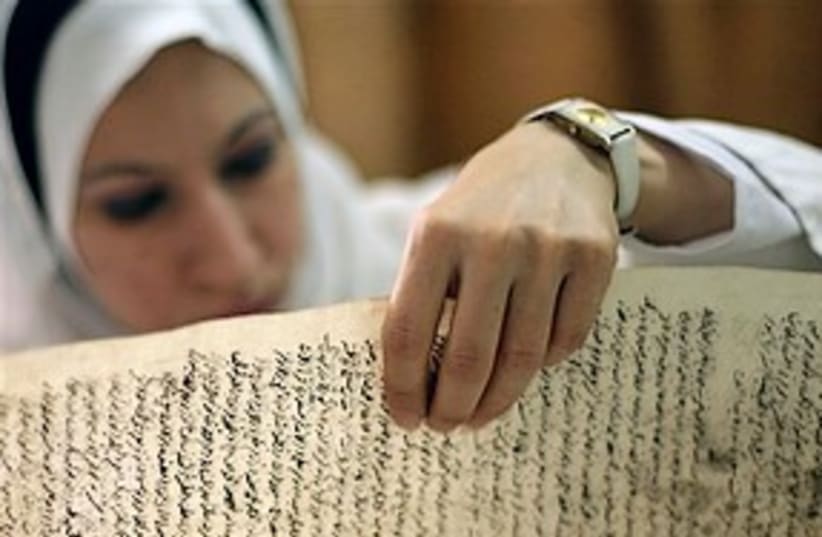Gila Naftali, an Egyptian born Jew who was expelled with her family in 1956 when she was eight years old, said there has been a systematic marginalization of eastern Jews. She was almost banished from the auditorium by security when she lashed out at MK Danny Ayalon that “You don’t know what it’s like to be kicked out of your country within 24 hours.”
Ayalon, a proponent of the bill whose father left his belongings behind in Algeria to come to the fledgling country in 1948, shook Naftali’s hand on his way out, in a gesture of reconciliation.The government came under criticism from Jews expelled from Arab states, who feel these initiatives are too little and too late. Others have questioned how the compensation, if acquired, will be allocated.“I don’t just want compensation,” Naftali later told The Media Line. “Everybody will get the compensation. I want money for this building that was in our family for four generations,” she said, brandishing a sepia photograph of her former Cairo home.Stanley Urman, executive director of JJAC said he was aware of these sentiments.“I feel for their plight and their pain,” he told The Media Line. “We, the Jewish people and the State of Israel, must take responsibility for not being successful enough in bringing this to the world’s attention.”The fact that the US has already passed a resolution to this effect could serve to impact any future negotiations.“They have sway,” Urman said, in reference to the US brokers. “Whether they bring this up in a forceful manner is yet to be seen. The US is a member of the Quartet and all seminal Middle East issues are going through the Quartet, so the US certainly would be our voice at that table.”The Israeli bill stipulates that “The state of Israel will not sign, directly or by proxy, any agreement or treaty with a country or authority dealing with a political settlement in the Middle East without ensuring the rights of Jewish refugees from Arab countries according to the UN’s refugee treaty.”“In any discussion where the Palestinian refugee issue is brought up in the framework of peace negotiations in the Middle East,” it continues, “the Israeli government will bring up the issue of compensation for loss of property and giving equal status to Arab refugees who left their property after the state was established and to Jewish refugees from Arab countries.”Ze’ev stressed that Iran was also included in the bill, even though it was not defined as an Arab country.Levana Zamir, chairman of the international organization of Egyptian Jews said she welcomed the initiative.“Finally, after 62 years, the Knesset is accepting a law that recognizes our rights,” she told The Media Line. “I’m just sad that my father didn’t have the privilege of seeing this. He fought for this and after he passed away I took the matter into my hands. As Jews from Egypt we should be very happy because there’s a peace agreement with Egypt, so once there’s a law, we should start demanding money.”Zvi Gabai, who represents Jews from Iraq, said it was a shame this was not done sooner.“In the meantime,” he said, “the Palestinians and spin doctors have exploited the Palestinian refugee matter and presented it as though the Palestinian refugees were the only issue and that there were no Jewish refugees, without presenting two sides of the coin – that there were not only the Palestinians who suffered but also Jews from Arab countries who suffered and lost property, without bringing this matter to a decision, there will be no justice.”The Palestinian Return Centre, a London-based organization defendingthe rights of Palestinian refugees with the aim of resettling them intheir original homes, said it was not farfetched to believe that Jewswould get compensation, but stressed that it was wrong to drawparallels between the two refugee populations.“The Jews who were kicked out of Arab countries have found a place tolive,” a spokesperson for the organization told The Media. “They havefound luxury, work, good housing and a government. But the Palestinianshave found nothing. They are not allowed to work in 70 professions inLebanon. They’re not allowed to travel. They don’t have passports orbasic freedoms and they’re being bombed in Gaza’s camps.”“There is no parallel in the suffering,” the spokesperson continued.“The Palestinian suffered double what the Jews in the Arab countriessuffered…. The [Arabs] have enough money and enough political will tosolve the problem with Israel, but the problem is with Israel. IfIsrael is willing to conduct peace on the basis of giving rights to thePalestinians, I guess the Arabs would compensate the Jews, if thathappened.”
Israel vies to bring Mideast Jewish refugees into talks
New bill to seek compensation for eastern Jews and cement their narrative as an integral part of any future peace negotiations.
